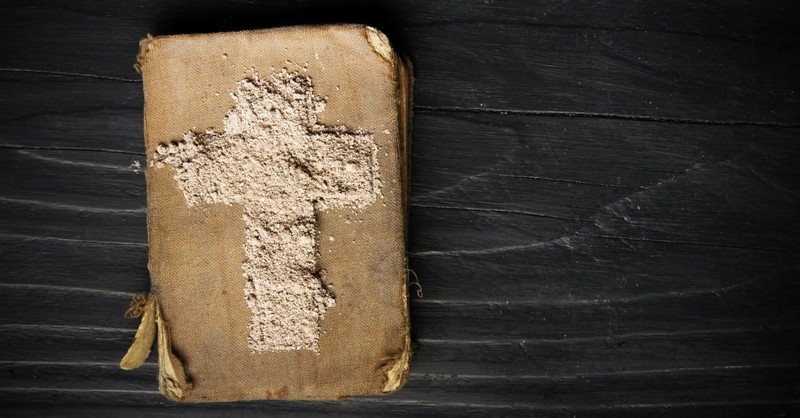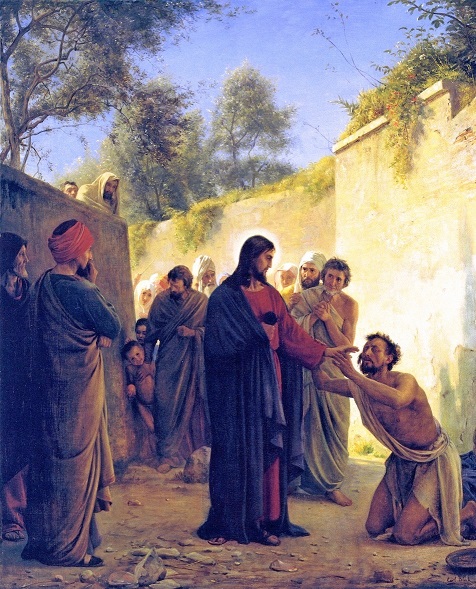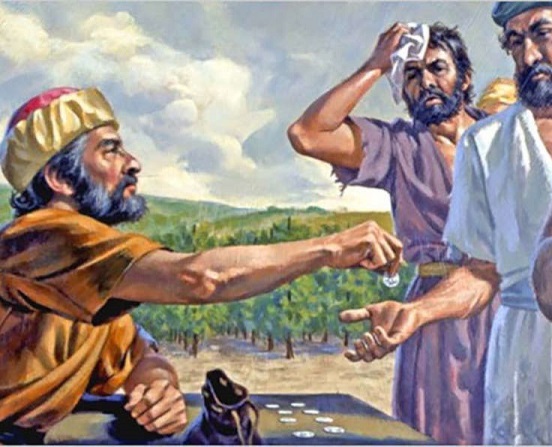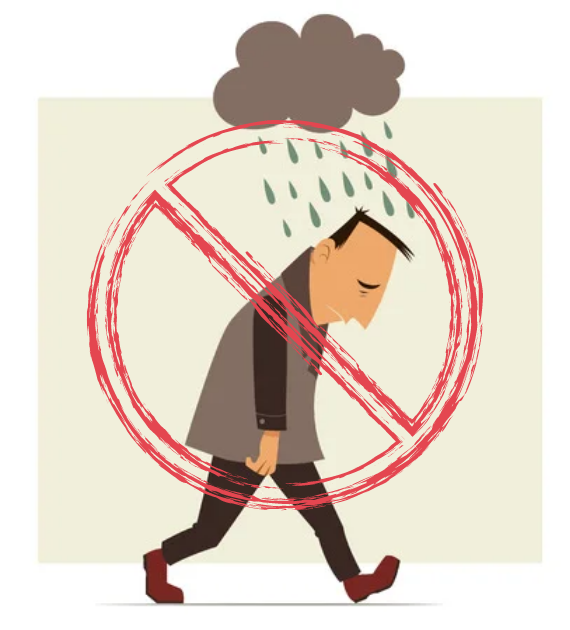Readings: 1 Samuel 16:1–13 | 1 Corinthians 13:1–13 | Luke 18:31-43
Text: Luke 18:31-43
These two accounts in St. Luke’s Gospel are arranged very intentionally. The disciples are placed side by side with a blind beggar. The disciples are sighted, but blind to see who Jesus is. The beggar is blind, but has faithful eyes which see who Jesus is. So we have the comparison of the blind man’s sight, and the sighted men’s blindness.
Another contrast in this portion of the Gospel is the two titles of Jesus: Son of Man and Son of David. Jesus speaks of Himself as the Son of Man. The title, “son of man” is used throughout the Old Testament to refer to a human being. It is “ben Adam,” a descendent of the first man, Adam. And that carries with it a lot of baggage: the first man sinned and died, bringing sin to all his descendants, and “death spread to all men because all sinned.”[1] The sons of man are dishonest and corrupt in their loyalties, so that God must point out that He, “is not man, that he should lie, or a son of man, that he should change his mind.”[2] And the sons of Adam—all of them—return to the dust from which they were taken, as Moses says in Psalm 90, “You return man to dust, and say ‘Return, O sons of man!’”[3]

We too are among those sons of Adam, which is why the Lenten season begins with the visual and tactile reminder: “Remember, O man, that thou art dust, and to dust thou shalt return.” (Genesis 3:19)
But when Jesus uses this term, He chooses to identify with these sons of Adam. He truly shares in the mortal existence of the sons of man. It’s precisely what He does as a son of Adam that’s important: Jesus, Son of Man, is born without sin and He does not sin. He loves the Lord His God with all His heart, soul, and strength, and does not worship any idols. And even though He is without sin, He suffers to be “delivered over to the Gentiles…[to] be mocked and shamefully treated and spit upon”…flogged and killed. This Son of Man dies, but “on the third day” rises again. It’s in foreshadowing this that Daniel is given the vision of the Son of Man who comes on the clouds of heaven and presents himself before the Ancient of Days (Dan. 7:13)
Therefore, as Jesus, the Son of Man, goes, so do the sons of Adam with Him. The sinless Son of Man knew no sin, so that the sons of Adam would be reckoned free from sin.[4] He suffers, bleeds, and goes down to the grave with the sons of man. But on the third day, He rises from the dead, “never to die again.”[5] And He brings the sons of man with Him, out of their graves. He ascends into heaven with the Father, and the sons of Adam follow Him and return to the presence of God.
The blind man, on the other hand, uses another name for Jesus: Son of David. And this is more than Solomon or Nathan,[6] or any of David’s other descendants. This is He of whom King David wrote in Psalm 110, “The Lord said to my Lord, ‘Sit at my right hand, until I make your enemies your footstool.’”[7] This is the Anointed One, the Messiah, of whom Isaiah wrote: “The Spirit of the Lord is upon me, because he has anointed me to proclaim good news to the poor. He has sent me to proclaim liberty to the captives and recovering of sight to the blind, to set at liberty those who are oppressed, to proclaim the year of the Lord’s favor.”[8]

So the blind man cries out after Jesus saying, “Jesus, Son of David, have mercy on me!” And who he thinks this Son of David is comes out when he asks for a remarkable thing: “Lord, let me recover my sight.” It may seem obvious that he wants to see again, but nowhere among any of the prophets, was a blind man ever given his sight.[9] There had been healings, resurrections, and miraculous feedings, but none had ever opened the eyes of the blind. That was reserved for the promised Son of David, God in the flesh. This blind man understands by his faith far better than the disciples who Jesus really is.
And it really is only understood by faith. In the clearest language possible, Jesus told His disciples, “everything that is written about the Son of Man by the prophets will be accomplished. 32 For he will be delivered over to the Gentiles and will be mocked and shamefully treated and spit upon. 33 And after flogging him, they will kill him, and on the third day he will rise.” But at that time, it was hidden from them. Only after His resurrection, and the giving of the Holy Spirit on Pentecost, did these things become clear.
What He says is no breaking news: Everything that is written is all of the Scriptures, from Moses to Malachi. Moses spoke of a prophet from among your brothers. Joshua spoke face to face with the Lord of Sabaoth—the commander of the Lord’s army. Samuel anointed the man after God’s heart. David sang of His sufferings and how evildoers would pierce his hands and feet. Isaiah foretold the Lord’s servant who would be pierced for our transgressions and crushed for our iniquities.[10] All the Scriptures were to be fulfilled, as Jesus was handed over, suffered, died, and rose on the third day.

But the disciples understood none of this. They were content to have a Messiah to talk and eat with, who challenged social norms and said things that made you think. That must be why He came—to be a role model and teacher. But they did not grasp what He truly came down from heaven to do, because they didn’t truly understand their sin. They think far too highly of themselves, so they only need a little help from Jesus. That’s why St. Luke puts them right up beside a blind beggar.
You see, the disciples are a lot like us. We confess with our mouths, I, a poor, miserable sinner, but too often, we make a confession that doesn’t dig very deep. We don’t really believe our sins are that bad, because there are other people who are worse. I only fudge the numbers on my taxes, but I’m no tax evader! Sure I called the President an idiot, but it’s not like I plotted to kill him! The Sports Illustrated models are nice, but I’m not like the guy who got caught with child pornography. As another pastor put it, “We damn ourselves by our faint confession.”[11] We are also blind men and women who really only want a Savior who only saves us from socially acceptable sins.
Repent.
If your sins aren’t that evil, why must the Son of Man be “delivered over to the Gentiles and will be mocked and shamefully treated and spit upon. And after flogging him, [and killed]”? If your sin is not that bad, then God paid too high a price for your life. Maybe He should ask for a refund.
Don’t you see this from the Word of God? We are poor and miserable, “we are by nature sinful and unclean. We have sinned in thought, word, and deed by what we have done and by what we have left undone.” Martin Luther aptly confessed before his death, “We are all beggars.” The blind beggar is us, chasing after the Lord for mercy. And casting aside every voice that says, “You’re a good person” and “Just believe in yourself,” we fall down on our knees before the Son of David and say, “Christ, have mercy upon me, a sinner.”[12] And He asks us what we want Him to do for us. He attentively listens as we say,

…forgive us, renew us, and lead us, so that we may delight in your will and walk in Your ways to the glory of Your holy name.
We ask Him for the forgiveness which flows from His betrayal and mocking and shameful treatment and being spat upon and flogged and killed. And He hears and answers each of us: “Your faith has saved you” (v. 42).
We, the Twelve, and the blind beggar are all the same. We all need God the Father to open our eyes to see ourselves in the unchanging and holy mirror of His Law, to see Jesus for who He is, and see the mercy which He gives. He is the Son of Man, who came to “raise the poor [sons of man] from the dust and lift the needy from the ash heap, to make them sit with princes, with the princes of his people.”[13] He is the Son of David, who came, not only open the eyes of the blind, but also to bestow the Lord’s favor and raise the dead to eternal life.
And He comes to you here, today. He came in the waters of your Baptism to nail your sins to His cross, and raise you to new life. There, the Holy Spirit opened your eyes to see. And He continually keeps your eyes open to see your Father’s mercy in His beloved Son. And by His mercy to us, son of Adam, will follow the Son of Man where He has gone, to be with your God forever. Upon receiving such priceless gifts, our lives become like that of the crowd who glorified God and gave Him the praise. Amen.

[1] Romans 5:12
[2] Numbers 23:19
[3] Psalm 90:2
[4] Genesis 15:6; 2 Corinthians 5:21
[5] Romans 6:9
[6] The human ancestry of Christ: 1 Chronicles 3:5, Luke 3:3:31
[7] Psalm 110:1, cited in Luke 20:42-43
[8] Luke 4:18-19, citing Isaiah 61:1-2 and 42:7
[9] cf. John 9:32
[10] Deuteronomy 18; Joshua 5:13-15; 1 Sam 13:14; Psalm 22; Isaiah 52-53
[11] Pastor David Peterson, Sermon for Quinquagesima, March 10, 2013
[12] Liturgical Kyrie and Luke 18:13
[13] Psalm 113:7-8










